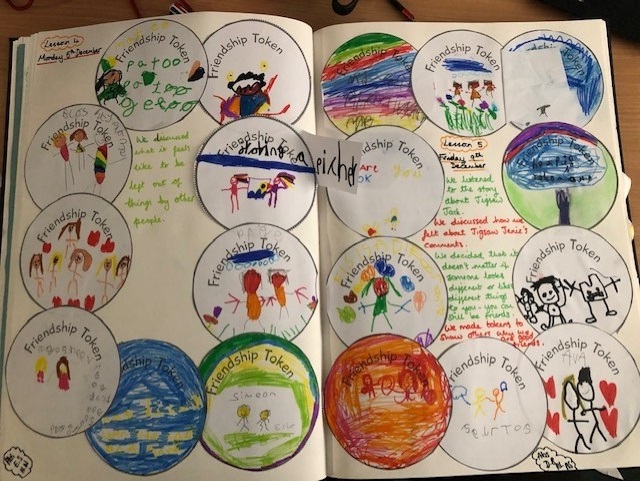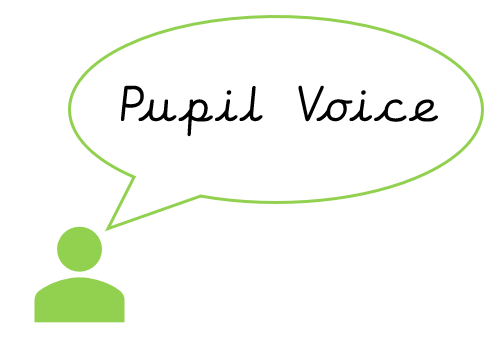PSHE, Relationship and Sex Education at Lenham Primary School

At Lenham Primary School, we teach Personal, Social, Health Education as a whole-school approach
to underpin children’s development as people and because we believe that this also supports their
learning capacity.
The Jigsaw Programme offers us a comprehensive, carefully thought-through Scheme of Work which
brings consistency and progression to our children’s learning in this vital curriculum area.
The overview of the programme can be seen on the school website.
This also supports the “Personal Development”and “Behaviour and Attitude” aspects required
under the Ofsted Inspection Framework, as well as significantly contributing to the school’s
Safeguarding and Equality Duties, the Government’s British Values aganda and the SMSC (Spiritual,
Moral, Social, Cultural) development opportunities provided for our children.

What skills have you learnt in PSHE this year?
I've learnt how to keep our bodies healthy and how to cross the road.
We learnt about friendship and how important it is to be kind to each other.
I've learnt about racism.
What is PSHE Education?
PSHE Education is a planned programme of learning through which children and young people acquire the knowledge, understanding and skills they need to manage their lives – now and in the future. As part of a whole-school approach, PSHE Education develops the qualities and attributes pupils need to thrive as individuals, family members and members of society.
What do schools have to teach in PSHE Education?
According to the latest guidance from the government, via the National Curriculum, every schools needs to have a broad and balanced curriculum that
• promotes the spiritual, moral, cultural, mental and physical development of pupils
at the school and of society, and
• prepares pupils at the school for the opportunities, responsibilities and
experiences of later life’
• promotes British values
At Lenham Primary School we follow a programme called Jigsaw.
What is Jigsaw, and how does it work?
Jigsaw is a comprehensive and completely original PSHE Education programme for the whole primary school from Years F1 and 2 through to Year 6 (ages 3-11). It was launched in July 2013 and hundreds of schools across the country are using it.
Jigsaw has two aims for all children:
• To build their capacity for learning
• To equip them for life
Jigsaw brings together PSHE Education, emotional literacy, mindfulness, social skills and spiritual development. A variety of
teaching strategies are used and are mindful of each child’s preferred learning style. Jigsaw is designed as a whole school approach, with all year groups working on the same theme (Puzzle) at the same time. This enables each Puzzle to start with an introductory assembly, generating a whole school focus for adults and children alike. There is a Weekly Celebration that highlights a theme from that week’s lesson across the school, and encourages children to reflect that learning in their behaviour and attitudes.
British Values
British Values are covered through the Jigsaw Scheme- see how by clicking here
Relationship and Sex Education
What is Relationship and Sex Education?
The Government’s definition is this:
“It is lifelong learning about physical, moral and emotional development. It is about the understanding of the importance of marriage for family life, stable and loving relationships, respect, love and care. It is also about the teaching of sex, sexuality, and sexual health. It is not about the promotion of sexual activity – this would be inappropriate teaching.” (Department for Education and Employment, SRE Guidance, 2000) Currently, PSHE (Personal, Social, Health Education) remains a non-statutory subject, and section 2.5 of the National Curriculum framework document states that:
‘All schools should make provision for personal, social, health and economic education (PSHE), drawing on good practice.’
However, from September 2019 Relationships Education will become statutory in Primary schools in England, with government guidance being offered during 2018 as to the expected content of this curriculum.
Why is RSE needed?
• More than ever before, children are exposed to representations of sex and sexuality through the media/ social media and the social culture around them, so we need to present a balanced view of RSE and help them to be discerning and stay safe.
• Rates of sexually-transmitted infections (STIs) and teenage pregnancy in the UK are relatively high – as is the regret felt by young people after early sexual experiences.
• Research shows that most parents say they want the support of schools in providing RSE for their children.
• Research consistently shows that effective RSE delays first sexual experience and reduces risk- taking.
• Surveys of children and young people, as well as Ofsted, have repeatedly told us that RSE tends to be “too little, too late and too biological”.
What are the aims of RSE?
There are four main aims for teaching RSE within the context of Primary School PSHE (Personal, Social, Health Education):
• To enable young people to understand and respect their bodies, and be able to cope with the changes puberty brings, without fear or confusion
• To help young people develop positive and healthy relationships appropriate to their age, development etc. (respect for self and others)
• To support young people to have positive self-esteem and body image, and to understand the influences and pressures around them
• To empower them to be safe and safeguarded

